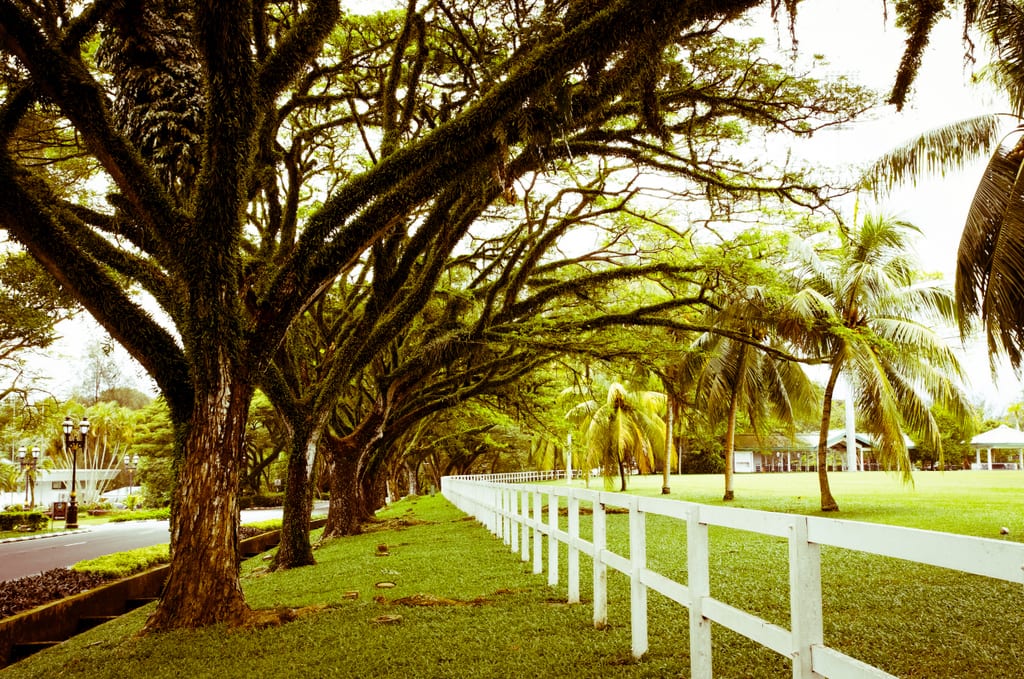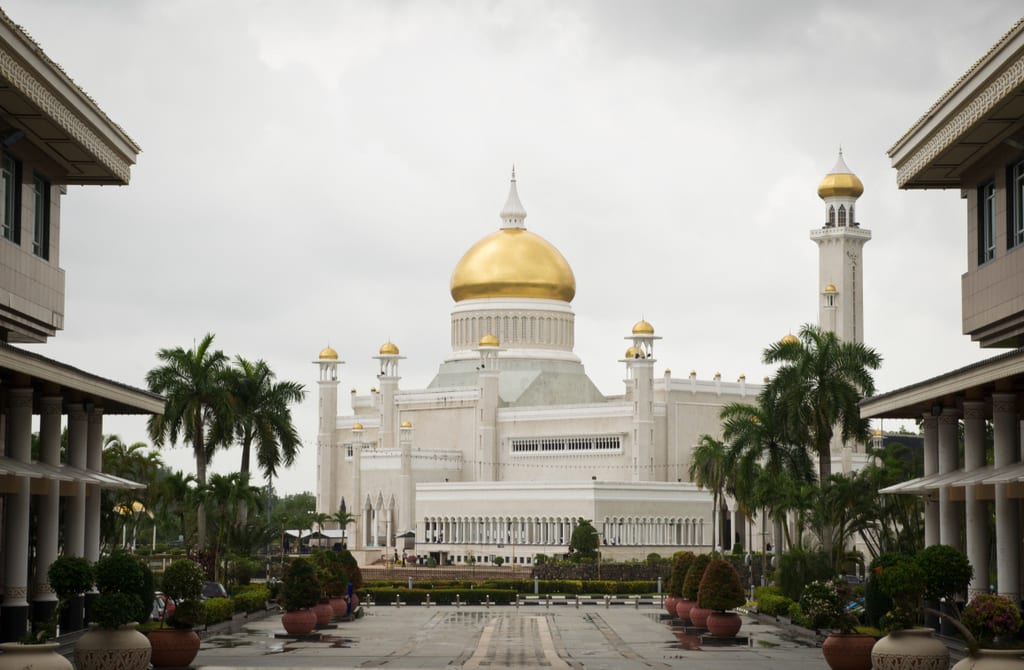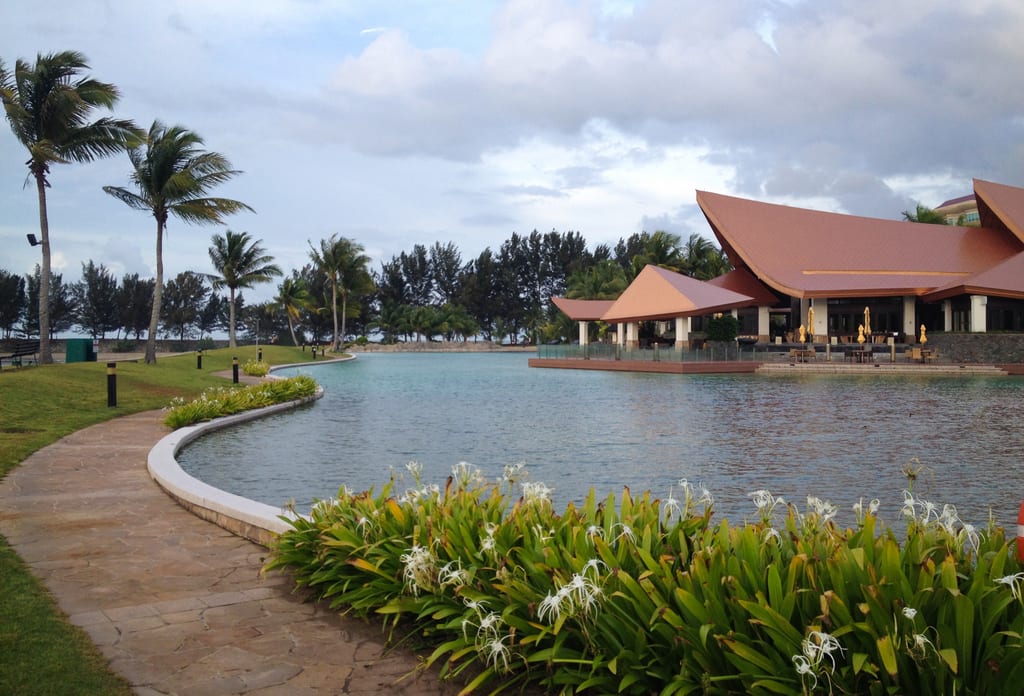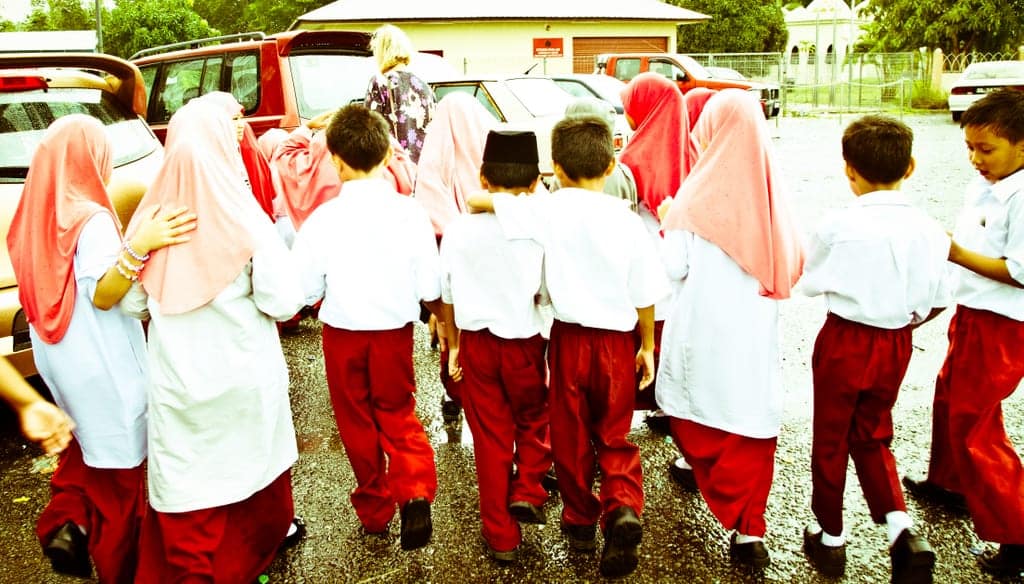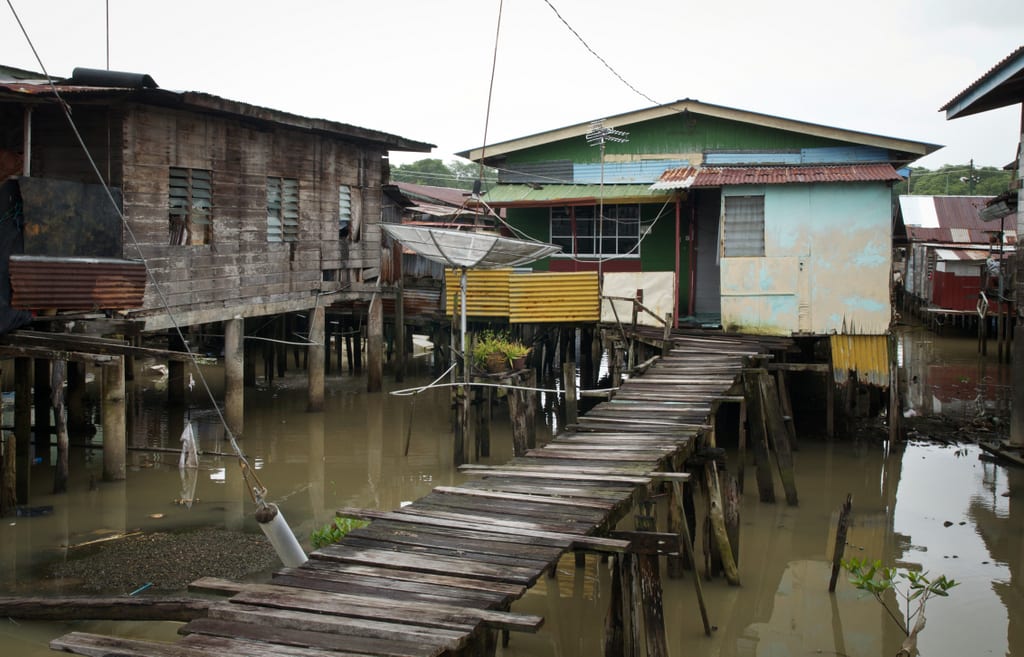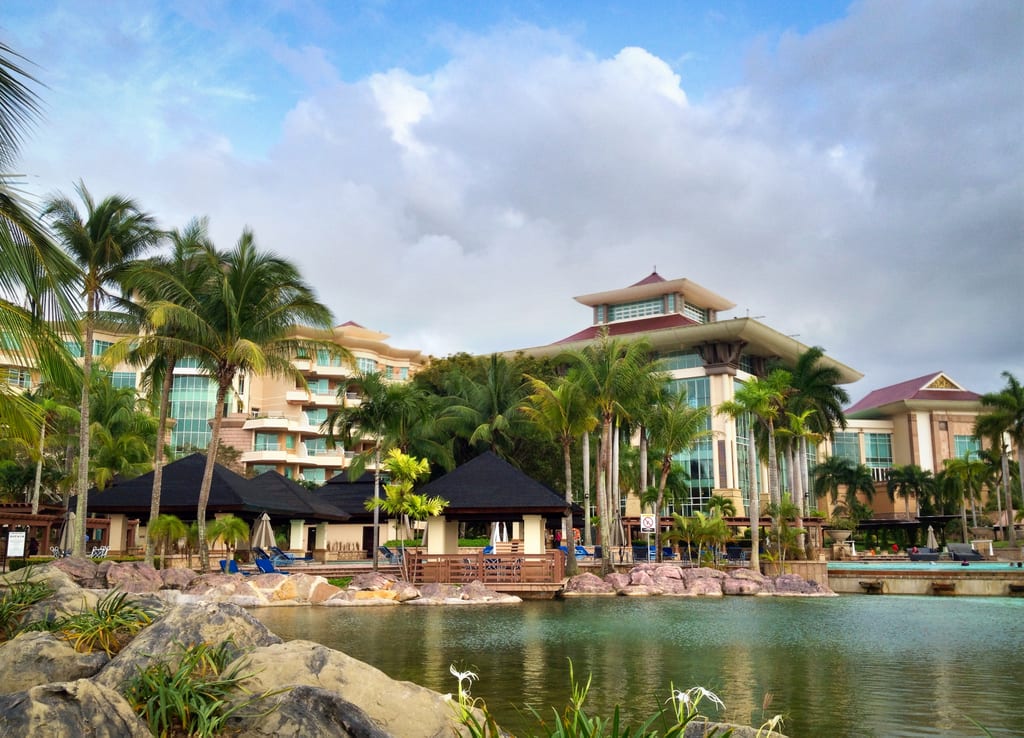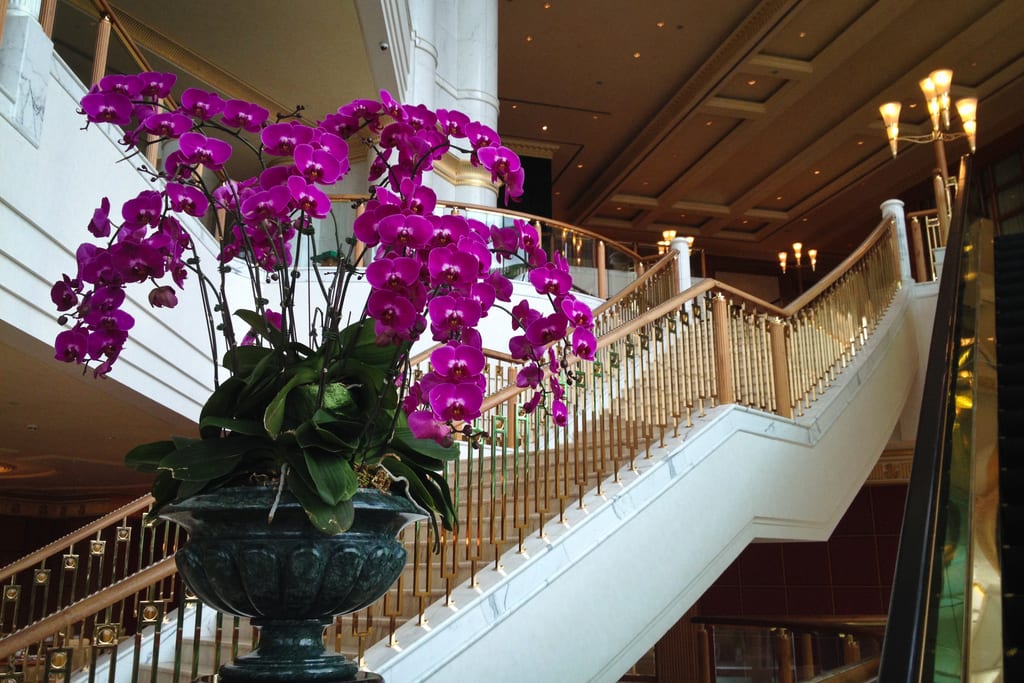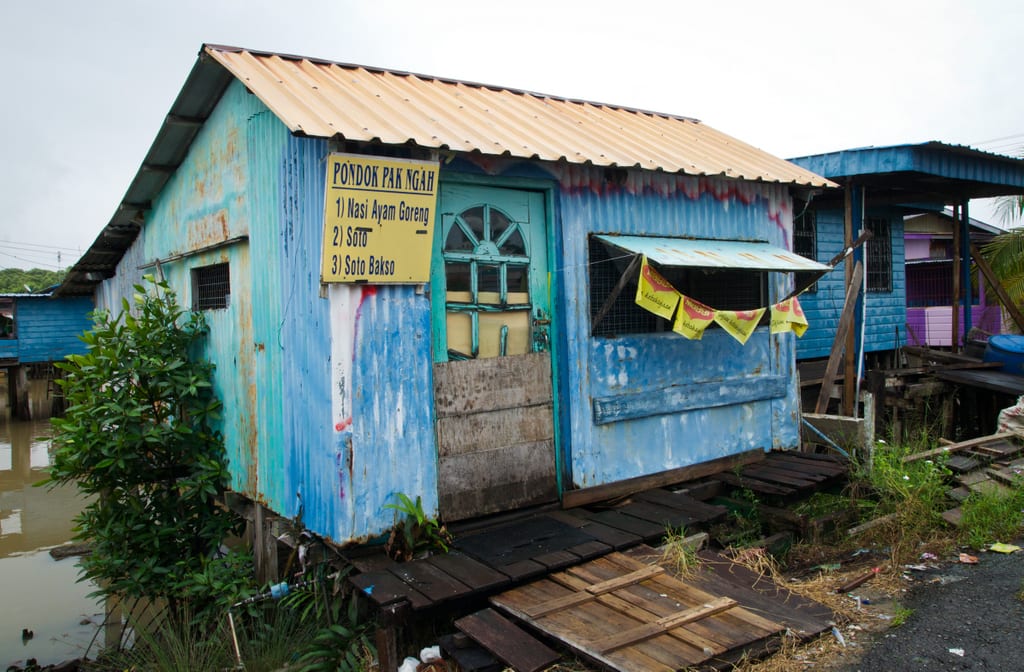Adventurous Kate contains affiliate links. If you make a purchase through these links, I will earn a commission at no extra cost to you. Thanks!
The expat community of Brunei was recently rattled by the sudden deportation of one of their own.
Most expats in Brunei either work in the oil industry or are teachers. One could make the argument that oil workers or English teachers are a dime a dozen here.
This man was neither. He held arguably the most prestigious hospitality job in the entire nation, and had held it for a long time. In other words, this wasn’t taken lightly.
The reason for his deportation? He dressed up as the Sultan of Brunei for Halloween.
I’ve been struggling with how to begin describing my experiences in Brunei, and I think that anecdote sums it up. I’m still trying to make sense of my time in Brunei. I found it dismaying and heartwarming. I found kindness and optimism amidst an increasingly dark regime.
Why did I end up in Brunei? This tiny Southeast Asian country, entirely contained on the island of Borneo, isn’t featured on most backpackers’ itineraries. But I have friend from home living here, whom I’ll call Allison, and she invited me to come visit. Allison and her husband, whom I’ll call Colin, have been living here for the past few years and have two children.
Due to the deportation of the prominent expat, I won’t be revealing their identities further than this. Just in case this wrong people discover this post.
Strict Islamic Society
While Southeast Asia has a few countries with a majority Muslim population, Brunei governs by a very strict form of Islam.
Every business in the country shuts down from 12:00 to 2:00 PM on Friday, the holy day. Every building in the country must be within “hearing distance” of a mosque for the call to prayer. Public school has a heavily religious component; some schools require children to change into white uniforms for religious instruction. All Muslim women are expected to wear the hijab, and it’s worn by young girls as well, which is unusual.
Most famously, the sale and consumption of alcohol is prohibited in Brunei, though foreigners may import up to two liters of spirits or wine and up to twelve cans of beer every 48 hours.
As you’d expect, Brunei is a difficult place to be gay. Acts of male homosexuality are illegal in Brunei and can be punished with up to 10 years in prison, though there are no laws against acts of female homosexuality. LGBT presence and culture are nonexistent. I met a well-known Bruneian who is assumed to be gay by most expats, but Bruneians don’t have a clue.
I actually broke a Bruneian law myself when Colin gave me a ride to a school. “The fact that we’re not married and I’m driving you alone in a car makes this illegal,” Colin told me. “But they won’t do anything about it.”
Believe it or not, bacon can actually be found in some grocery stores — but it’s kept in a private room in the back for non-halal meat, where it’s wrapped up so Bruneians won’t see it.
In fact, Allison told me that if you bring bacon into the country, the customs officials will recoil and wave you through so they don’t have to touch it. “You could smuggle in kilos of cocaine underneath a pile of bacon and they wouldn’t notice,” she laughed.
The Sultan is All-Powerful
The Sultan of Brunei is one of the world’s richest men and an all-powerful figure within the country. Though he’s beloved by most of his subjects, unlimited power and a country rich in oil has led to a life of excess, whether it’s ceremonial chariots pulled by dozens of men or his more than 500 luxury cars. And some would say it’s led to megalomania as well.
Remember how Prince William and Kate Middleton’s wedding, though scheduled with military precision to the minute, was delayed? It was because of the Sultan of Brunei, who arrived fashionably late.
At the Royal Regalia Museum in Bandar Seri Begawan, you’ll find the chariots in question, as well as tribal canoes, crystal ships, a vase from the Queen of England, and other gifts for the man who has everything.
Increasingly Fundamentalist
In October it was decided that sharia law would be implemented in Brunei starting in April. This will supposedly only apply to Muslims (and with so many expats and guest workers, only about two-thirds of Brunei’s population is Muslim). There won’t be changes in many of the restrictions, as the country is already quite strict, but brutal punishments like public flogging, stoning and even amputation of limbs could take place.
“It is because of our need that Allah the Almighty, in all his generosity, has created laws for us, so that we can utilize them to obtain justice,” the Sultan said.
Some people think that this is because the Sultan is becoming increasingly god-fearing as he grows older. Like many a Saudi prince, the Sultan of Brunei had a reputation as an international playboy in his youth before returning home and adopting a more devout lifestyle.
One Bruneian whom I would describe as far more liberal than the typical citizen had something surprising to say about the implementation of sharia law: “The Sultan wouldn’t be doing this if we weren’t doing something wrong.”
No Free Speech
There is no free speech in Brunei, and the media is controlled by the government, including Brunei’s two major newspapers, The Brunei Times and the Borneo Bulletin. I was interviewed for both publications after I spoke to students about our writing and journalism careers at Jerudong International School (JIS).
I later met with a foreign-born Brunei journalist who bemoaned the state of journalism in the country. Basically, he told me, the journalists sit around in their office and wait for the government to call them. The newspapers are collections of press releases, and the overall quality of the journalism is low.
Bruneian journalists don’t want free speech, he told me, and pointed to instances in other countries that the introduction of free speech led to demonstrations and protests. That’s a small price to pay, I told him. He shook his head.
Truthfully, the journalist said, most Brunei journalists don’t want free speech because it means they’ll have to start doing real work.
Expat Life
So how do you get by when living in such a strict country? For many Brunei expats, they call the “milkman,” a Chinese booze dealer within the country.
You want alcohol? You text your milkman, he’ll tell you what he has in stock, you tell him what you’d like, and he’ll have it delivered to you discreetly. He’s like a drug dealer, only for alcohol.
But that’s for expats’ eyes only — as soon as Bruneians appear in an expat’s home, any and all alcohol is hidden away. Colin and Allison have a bar in their home, and when it came time for one of their children’s birthday parties, they hid the alcohol and covered the bar with a blanket.
There is a constant wariness that comes with living in Brunei. At any moment, a Bruneian could report your less-than-holy actions. While it’s technically legal to have alcohol in a private home, the corruption of Bruneians is a far more blurred line.
So the expats band together — the teachers, the oil workers, the others, ensconced in their circle of trust. They bond over the difficulties of living in such a strict culture as they imbibe the forbidden libations, a quiet rebellion that will never see the light of day.
For that reason, I understand how it would be possible to develop a drinking problem in a dry country.
It’s All a Facade
Whether you’re walking through downtown Bandar Seri Begawan or driving along the highways, Brunei looks like it’s stuck in the 90s. Billboards are ancient. Letters are falling off signs. There is no sense of aesthetics. Despite the amount of money the country has, it’s not being spent on making it look good.
The Empire Hotel, Brunei’s most exclusive resort, is an exception. A dramatic behemoth covered with gold, the hotel proudly wears the fictitious “seven-star” moniker, just like the Burj al Arab in Dubai. Take a look at the fanciest suites — far more opulent than the #2 suite at the Burj al Arab!
I took Colin and Allison and their kids out for afternoon tea. While the tea featured delicious cakes and was excellent value (20 Brunei dollars per person, or $16 USD), the service was perplexing.
“Can I get something for the kids to drink?” Allison asked the waitress. She stared back blankly. “Apple juice?” Allison suggested.
The kids were brought apple juice in fancy V-shaped tumblers that nobody in the western world would dream of giving to a young child. Now, I don’t think that every restaurant should cater to kids with crayons and sippy cups, but isn’t it obvious that you should serve young children drinks in a cup that is least likely to be spilled?
Allison and I had talked a lot about her experiences with kids in Brunei, and the recurring theme that I gleaned from her experiences is that children are largely ignored, even when you try to make special preparations for them in advance.
After an hour or so of exploring the hotel’s grounds, we walked back through the “seven-star” lobby again. Our dirty plates were still waiting to be cleared.
The Value of Visiting Brunei
My week in Brunei was incredible.
I helped shy nine-year-olds practice their English, knowing that they will likely never leave home.
I gave interviews to journalists who have never known freedom of the press.
I explored a poverty-stricken village built on stilts in the morning and visited the British High Commissioner in the afternoon.
I drank, spoke freely, and rode in a car with a man who wasn’t my husband.
What I learned from the people here could fill books — and yet I could never adequately describe a word of it.
But as far as tourist value goes, Brunei doesn’t have much. I don’t see any reason to come here as a tourist unless you just want to say that you’ve been here.
One of the tourist activities where Brunei excels, however, is a visit to the rainforest in Temburon province, where you can walk above the canopy and stay in the jungle overnight. (Ironically, I was so busy meeting people in Brunei that I had no time to do the main iconic activity!)
Beyond that, there’s not much to do, but I recommend taking a tour of the water villages (which you can do from downtown Bandar Seri Begawan), seeing the beautiful Sultan Omar Ali Saifuddien Mosque, visiting the Royal Regalia Museum, and having afternoon tea at the Empire Hotel.
What’s Next?
I’ll be following Brunei in the news once they introduce sharia law and see how it plays out on the world stage — whether they will continue to increase their fundamentalism or pull back in order to placate foreigners. Whether they will tolerate the expats or deport them at the drop of a hat.
I felt uneasy the whole time I was in Brunei and I feel even more uneasy when thinking of it’s future. I don’t think I’m going to like what I see in the future.
Essential Info: Several major airlines fly to Bandar Seri Begawan in Brunei, including Air Asia, Thai Airways, Singapore Airlines, and the national carrier, Royal Brunei. You can also enter overland from Sarawak in Malaysia.
The Royal Regalia Museum, Sultan Omar Ali Saifuddien Mosque, and the Empire Hotel are free to visit. No photos are permitted in the Royal Regalia Museum. You can explore the water villages on foot for free or bargain with a local for a boat ride. Several companies offer varying tours of the rainforest; it’s best to research before arriving.
I stayed with friends while in Brunei – you can find hotels here.
Be sure to get travel insurance before heading to Brunei. I never travel without it and always use World Nomads.

